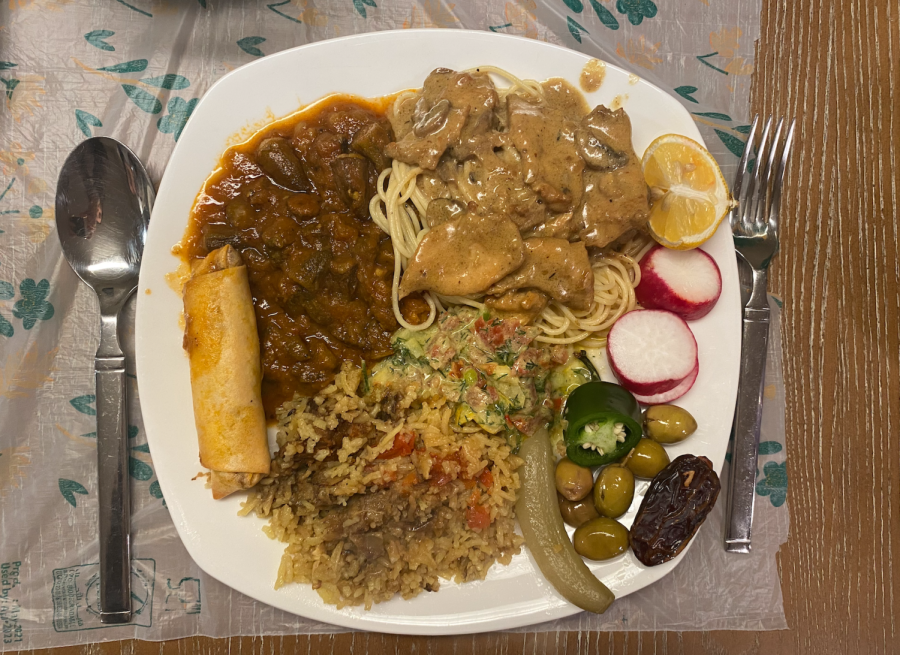How does fasting during Ramadan affect students health?
Every year Muslims observe the holy month of Ramadan. The holiday falls on the 9th month of the Islamic calendar and those observing are meant to use the time to reflect, pray, and give charity.
One of the major aspects of Ramadan is fasting. Muslims are expected to refrain from eating from sunrise to sunset for 30 days straight. The purpose of fasting is to remind people of the privilege they have to eat three meals a day and to bring them closer to God.
“I feel more energetic when I’m fasting and I’m not as hungry as I normally am when I’m not fasting. I also noticed I play better when playing sports. Although I get really thirsty, I enjoy fasting and it’s not that bad” said senior Sarah Baluch
Experts have found that abstaining from eating can help prevent high cholesterol, obesity, and heart disease. It can also help improve a person’s mental well-being.
When withstanding eating, it removes toxins from the digestive system since there is no food being digested.
According to nutritionist Calire Mahy, fasting helps the gut cleanse as well as strengthen its lining. “It can also stimulate a process called autophagy, which is where cells self-cleanse and remove damaged and dangerous particles,” said Mahy
There has also been proven for there to be a direct correlation between gut health and mental health so when the gut improves, it positively affects the mind. This means that fasting can reduce depression and anxiety as well as reduce the risk of getting dementia.
“When I start out fasting it does take a toll on my health because it makes me tired. But I adjust quickly and I realize how little energy I truly need to get throughout the day,” said junior vice-principal Dr.Eqab
“Fasting also helps me mentally because we don’t realize how much time we truly spend thinking about food so when I’m not thinking about it, I have the opportunity to think about other things,” said Eqab
Fasting also gives those who participate an opportunity to lose weight. When fasting correctly, our bodies have the potential to lose weight and focus on gaining muscle mass.
Although, the weight that is lost can very easily be gained back considering this is not a lifestyle, going back to eating three meals a day will regulate your body fat.
If done incorrectly, fasting can also be harmful to a person’s health. When doing so, it is important to drink and eat enough water to sustain your body throughout the day.
Many Muslims participate in what’s called Suhoor which is the meal eaten before sunrise. This meal usually consists of light but fulfilling foods such as cereal or fruit. They also take this time to drink tons of water.
It’s important to stay hydrated when fasting, as dehydration is a common factor that many Muslims suffer from throughout Ramadan.
Some ways to avoid this are eating foods that do not make you thirsty and drinking at least 8 cups of water throughout the night.
“When I’m fasting, it makes me really grateful for the food that I always have access to. It makes me realize how much I take things for granted and I try to incorporate that gratefulness into my daily life.” said junior Shahidah Kargbo
Although weight loss is a possibility, many actually gain weight throughout the month. This is because overeating is a common practice that many do when breaking their fast because they overcompensate their hunger.
Since the fast is broken at sunset, many overeat and do not move around after doing so, thus causing the body to have difficulty digesting food.
To avoid this, it’s important to still have balanced and healthy meals. Experts recommend filling half your plate with vegetables or a salad, a quarter of the plate with protein, and the rest with carbs.
In order to sustain any progress that you make mentally or physically, it is important to build these healthy habits into your lifestyle.
For example, if you are practicing gratitude throughout the month and it is benefitting your mental health, it is important to build that habit into your life outside of Ramadan to truly see the benefits.
Another way to benefit your health is working out while fasting. Although drinking water is prohibited, there are many benefits to working out when fasting such as lowering blood sugar and increasing human growth hormones.
Especially if you are an athlete, it is important to maintain your skill/ muscle levels even when participating in the holy month.

Senior Sereene Darwiesh has been on The A-Blast since freshman year. She spends her time reading and hanging out with friends, her hobbies consist of baking...










